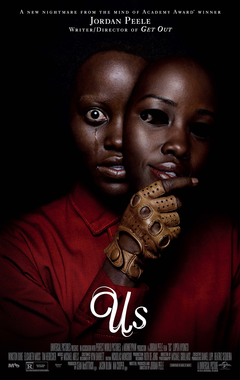“They’re us,” a child says in Jordan Peele’s second film, Us.
And indeed, they are. Us suggests that everyone has at least one doppelganger, living underground in conditions of absolutely misery and awkwardly imitating the same lives as those above ground, just without any of the rewards that those of us above-ground take for granted. Those underground are known as the Tethered, because they’re permanently tied to those of us above ground. Of course, what’s easily overlooked is that we’red tied to them as well. Or, at least, we are until someone picks up a knife or a pair of scissors and violently severs the connection.
It’s probably not a coincidence that the film’s title — Us — can just as easily be read as U.S, as in the United States. Jordan Peele may have said that he wanted Us to be a full-on horror film, as opposed to Get Out‘s mix of comedy, horror, and social commentary, but Us definitely has its political subtext, with the Tethered meant to stand in for every marginalized group that has been pushed underground by American society. Though the film may have been inspired by an episode of The Twilight Zone, it actually has more in common with the classic British shocker, Death Line (a.k.a. Raw Meat.) There’s not a huge amount of difference between the largely mute Tethered and the pathetic cannibal in Death Line who, after growing up in the British Underground, is capable of only telling his victims to “Mind the doors.”
If nothing else, Us proves that Jordan Peele actually is a good filmmaker with a firm grasp on how to make an effective horror movie. Get Out was good but also, I think, a bit overpraised by mainstream critics who often seemed to not realize just how much, in their attempts to make sure that we understood just how much they loved and understood the movie, they sounded like Bradley Whitford bragging about how he would have voted for Obama a third time. When Us came out, a lot of viewers were waiting to see if Peele’s second film could possibly live up to all the hype surrounding its director and, for the most part, it does.
Political subtext aside, this is the all-out horror film that Peele promised, full of jump scares, disturbing imagery, and just enough humor to keep things from getting too unbearably nightmarish. (As bad as you might feel for Elisabeth Moss’s character and her family, it’s hard not to appreciate the irony of the film’s Alexa-substitute misunderstanding a command to call the police.) Interestingly enough, the Tethered are pretty much homicidal as soon as they come above ground. This isn’t a case where a tragic misunderstanding leads to bloodshed that could have been avoided. No, this is a case where the Tethered have spent decades trapped and out-of-sight and they’re pissed off about it. Just because the Tethered may be us, that doesn’t mean that they’re going to have any sympathy for us when they finally do track us down. In the style of Wes Craven’s The Hills Have Have Eyes, Us follows a perfect family as they eventually find themselves resorting to the same violence as the Tethered, in an attempt to save not only their lives but also the lifestyle that they’ve come to take for granted. The Tethred are us indeed.
The film is well-acted, with Lupita Nyong’o standing out as both the mother of an imperiled family and her doppelganger, who has spent years underground and who is one of the few Tethered to be able to speak. Of course, there’s a twist at the end of the movie and I won’t ruin it here, other than to say that it’s effectively done and will actually make you reconsider everything that you’ve just seen.
Us is another triumph from Jordan Peele. Even more importantly, it’s an undeniably effective horror film.

